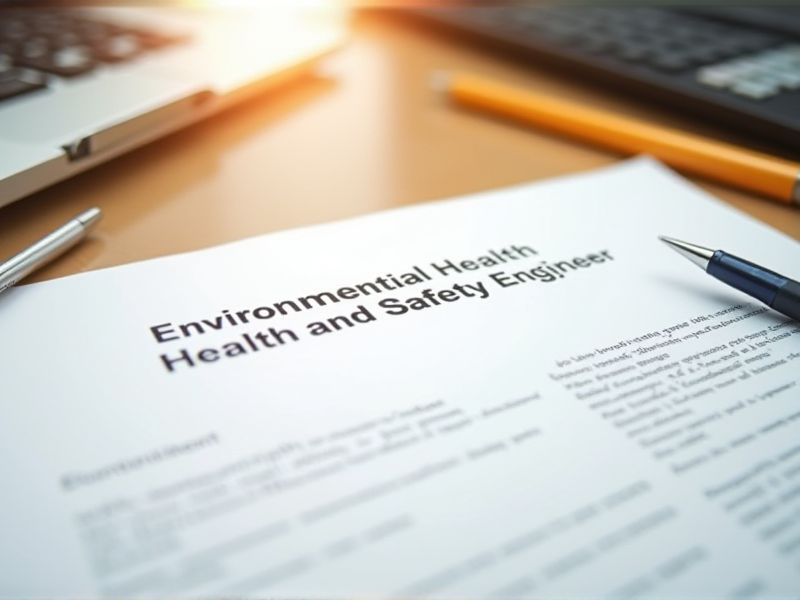
Environmental Health and Safety Engineers play a vital role in maintaining safe workplace environments, reducing accidents and ensuring regulatory compliance. Obtaining certifications validates their expertise, aligning their skills with industry standards and legal requirements. These credentials enhance an engineer's capability to assess risks effectively and implement proactive measures. Key certifications vital for an Environmental Health and Safety Engineer include the following.
Certified Safety Professional (CSP)
Holding a Certified Safety Professional (CSP) credential signals an individual's expertise in ensuring safe work environments, giving organizations confidence in their hazard management capabilities. The rigorous process of obtaining a CSP involves education, experience, and challenging examinations, verifying an EHS engineer's competence and up-to-date knowledge. Companies often see CSP holders as assets because they help minimize workplace incidents, leading to reduced liabilities and enhanced productivity. The CSP designation often results in higher career advancement opportunities and potential salary benefits, reflecting its value in the industry's recognition of safety leadership.
Certified Industrial Hygienist (CIH)
Certified Industrial Hygienists (CIH) possess specialized knowledge in identifying and assessing workplace hazards, which is crucial for Environmental Health and Safety Engineers who focus on maintaining safe working environments. Their expertise in exposure assessment and risk management ensures effective implementation of safety protocols. CIHs can also provide critical insights into regulatory compliance, aiding engineers in adhering to legal safety standards. Collaborative efforts with CIHs enhance the overall safety culture, reducing occupational health risks.
NEBOSH International General Certificate in Occupational Health and Safety
Earning the NEBOSH International General Certificate in Occupational Health and Safety provides Environmental Health and Safety Engineers with globally recognized qualifications, enhancing their professional credibility. This certification equips them with fundamental knowledge of health and safety principles, essential for effective risk management in various industries. Possessing this credential ensures they can identify workplace hazards and implement practical solutions to mitigate risks. As a result, they can contribute to creating safer work environments, which aligns with organizational and regulatory compliance requirements.
OSHA 30-Hour Training Certification
Environmental Health and Safety Engineers require the OSHA 30-Hour Training Certification to ensure they understand comprehensive workplace safety and regulatory standards. This certification equips them with the knowledge to identify and mitigate potential hazards which reduces workplace accidents. Possessing the certification enhances an engineer's credibility and compliance with federal safety regulations becomes more seamless. As safety standards evolve, the certification helps engineers stay current with best practices, safeguarding both workers and the environment.
ISO 45001 Lead Auditor Certification
ISO 45001 Lead Auditor Certification equips Environmental Health and Safety Engineers with the necessary skills to conduct rigorous audits, ensuring workplace safety standards are consistently met. It provides a framework for identifying and mitigating risks, enhancing the organization's overall safety performance. Understanding international safety standards through this certification can lead to improved compliance with legal and regulatory requirements. Certification in ISO 45001 can also increase professional credibility and career advancement opportunities in the safety management sector.
Certified Hazardous Materials Manager (CHMM)
Environmental Health and Safety Engineers must address hazardous materials responsibly, which requires the expertise a CHMM provides in managing such materials effectively. Legal compliance demands in-depth knowledge and certification, ensuring companies meet local and federal regulations; a CHMM can fulfill this requirement. Accidents and environmental incidents in industrial settings decrease when CHMMs contribute their specialized risk assessment skills. Efficient hazardous waste management through CHMMs leads to cost savings by minimizing disposal liabilities and avoiding potential fines.
Registered Environmental Health Specialist/Practitioner (REHS/REHP)
Registered Environmental Health Specialists/Practitioners (REHS/REHP) are needed because they possess specialized knowledge in mitigating health risks and ensuring safety compliance in various environments. Their expertise in public health regulations complements the technical focus of Environmental Health and Safety Engineers, leading to more effective risk assessments. They facilitate interdisciplinary collaboration, integrating environmental science with health policies to improve workplace safety. By bridging the gap between environmental concerns and health standards, they enhance the overall safety and health planning processes.
LEED Accredited Professional (LEED AP)
Achieving LEED Accredited Professional status enables an Environmental Health and Safety Engineer to adeptly integrate sustainable practices into building and design projects. LEED AP knowledge enhances project outcomes by promoting energy efficiency, reducing waste, and facilitating healthier building environments. This advanced understanding of LEED standards is critical for meeting regulatory compliance and achieving certification goals in environmentally conscious construction. By embedding LEED principles, engineers can significantly contribute to long-term sustainability and safety in their projects.
Certified Safety Manager (CSM)
A Certified Safety Manager (CSM) provides essential expertise in risk management, which directly enhances an Environmental Health and Safety (EHS) Engineer's ability to identify and mitigate workplace hazards. Legal compliance is strengthened through the CSM's understanding of relevant regulations, reducing the risk of fines and legal issues for the company. The specialized training of a CSM in emergency response planning equips EHS Engineers with strategic frameworks to effectively manage potential crises. Cost efficiency is improved as a CSM's proactive safety measures lead to fewer accidents, lowering overall operational expenses.
Six Sigma Green Belt Certification
Obtaining a Six Sigma Green Belt Certification enables an Environmental Health and Safety Engineer to enhance process efficiency by systematically reducing waste, which directly leads to a safer work environment. Mastery of Six Sigma tools allows these engineers to identify and rectify errors in safety protocols, effectively minimizing workplace hazards. The certification equips professionals with skills to statistically analyze data and drive evidence-based environmental improvements. Organizations benefit from certified engineers as they contribute to sustainable practices, meeting regulatory compliance and reducing costs associated with accidents and waste.
Summary
With certifications, you can significantly enhance your expertise in Environmental Health and Safety roles. Credentials often lead to improved job prospects and potentially higher salaries due to recognition of specialized skills. Your professional credibility can increase, encouraging trust and collaboration within your workplace. Certification might also offer you a competitive edge in adopting the latest industry standards and practices.
